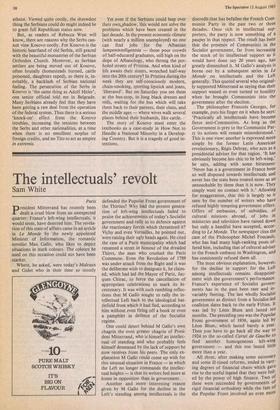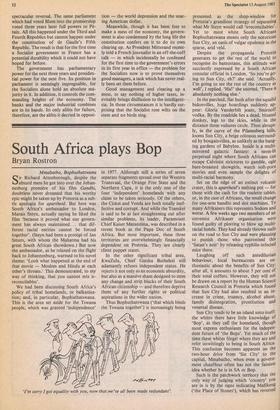The intellectuals' revolt
Sam White
Paris president Mitterrand has recently been 1 dealt a cruel blow from an unexpected quarter: France's left-wing intellectuals, it would seem, have deserted him. The revela- tion of this state of affairs came in an article in Le Monde by the newly appointed Minister of Information, the romantic novelist Max Gallo, who likes to depict situations in stark colours. The colours he used on this occasion could not have been starker.
Where, he asked, were today's Malraux and Gides who in their time so stoutly defended the Popular Front government of the Thirties? Why had the present genera- tion of left-wing intellectuals failed to praise the achievements of today's Socialist government and rally to its defence against the reactionary forces which threatened it? Vichy and even Versailles, he pointed out, 'were raising their ugly heads again. He cited the case of a Paris municipality which had renamed a street in honour of the dreaded Thiers, the man who crushed the Paris Commune. Even the Revolution of 1789 was under attack from the Right and it was the deliberate wish to denigrate it, he claim- ed, which had led the Mayor of Paris, Jac- ques Chirac, to force the cancellation of appropriate celebrations to mark its bi- centenary. It was with such rambling reflec- tions that M Gallo sought to rally the in- tellectual Left back to the ideological bat- tlefield from which it had fled, according to him without even firing off a book or even a pamphlet in defence of the Socialist regime.
One could detect behind M Gallo's own chagrin the even greater chagrin of Presi- dent Mitterrand, who is himself an intellec- tual of standing and who probably feels himself demeaned by the lack of support he now receives from his peers. The only ex- planation M Gallo could come up with for this unusual situation in France — in which the Left no longer commands the intellec- tual heights — is that its writers feel more at home in opposition than in government.
Another and more interesting reason given by M Gallo for the decline in the Left's standing among intellectuals is the
discredit that has befallen the French Com- munist Party in the past two or three decades. Once rich in intellectual sup- porters, the party is now something of a pauper in that respect. The result has been that the presence of Communists in the Socialist government, far from increasing the stock of its intellectual support as it would have done say 20 years ago, has greatly diminished it. M Gallo's analysis is borne out by a subsequent series in Le Monde on intellectuals and the Left generally. This quoted several who original- ly supported Mitterrand as saying that their support waned or even turned to hostility when he brought Communists into the government after the election.
The philosopher Francois Georges, for example, puts his finger on it when he says: 'Practically all intellectuals have become fierce anti-Communists. As long as the Government is prey to the Communist Par- ty its actions will remain misunderstood.' This is one view: another is expressed more simply by the former Latin American revolutionary, Regis Debray, who acts as a presidential adviser for that region. '11 has obviously become less chic to be left-wing,' he says, adding with some bitterness: `Never has a a government in France been so well disposed towards intellectuals and never has the state been treated more as an untouchable by them than it is now. They simply want no contact with it.' Allowing for exaggeration, that this is largely so is seen by the number of writers who have refused highly tempting government offers. Offers of embassies, of subsidies, of cultural missions abroad, of jobs in ministries and television have rained down but only a handful have accepted, accor- ding to Le Monde. The newspaper cites the case of the Philosopher Michel Foucault, who has had many high-ranking posts of- fered him, including that of cultural adviser to the French embassy in Washington, and has consistently refused them all.
The most obvious explanation, however, for the decline in support for the Left among intellectuals remains disappoint- ment with the government's performance. France's experience of Socialist govern- ments has in the past been rare and in- variably fleeting. The last wholly Socialist government as distinct from a Socialist-led coalition dates back to the early Fifties. It was led by Leon Blum and lasted ten months. The preceding one was the Popular Front government of 1936, again led by Leon Blum, which lasted barely a year. Then you have to go back all the way to 1924 to the so-called Cartel de Gauche to find another homogeneous left-wing government — and this too lasted little more than a year.
All three, after making some necessary and some ill-timed reforms, ended in vary- ing degrees of financial chaos which gave rise to the useful legend that they were foil- ed by the power of high finance. Two of these were succeeded by governments of rigid financial orthodoxy while the fate of the Popular Front involved an even more spectacular reversal. The same parliament which had voted Blum into the premiership voted three years later full powers to Pe- tain. All this happened under the Third and Fourth Republics but cannot happen under the constitution of de Gaulle's Fifth Republic. The result is that for the first time a Socialist government in France has a potential durability which it could not have hoped for before.
The government has parliamentary power for the next three years and presiden- tial power for the next five. Its position in parliament is seemingly impregnable, for the Socialists alone hold an absolute ma- jority in it. In addition, it controls the com- manding heights of the economy. The banks and the major industrial combines are in its hands. Its only alibis for failure, therefore, are the alibis it decried in opposi- tion — the world depression and the soar- ing American dollar.
Meanwhile, though it has been free to make a mess of the economy, the govern- ment is also condemned by the long life the constitution confers on it to do its own clearing up. As President Mitterand recent- ly told a French journalist in an off-the-cuff talk — in which incidentally he confessed for the first time to the government's errors in its first year in office — the problem for the Socialists now is to prove themselves good managers, a task which has never real- ly been set them before.
Good management and clearing up a mess, to say nothing of higher taxes, in- evitably brings disillusion to the intelligent- sia. In those circumstances it is hardly sur- prising that the Socialist rose wilts on the stem and no birds sing.







































 Previous page
Previous page